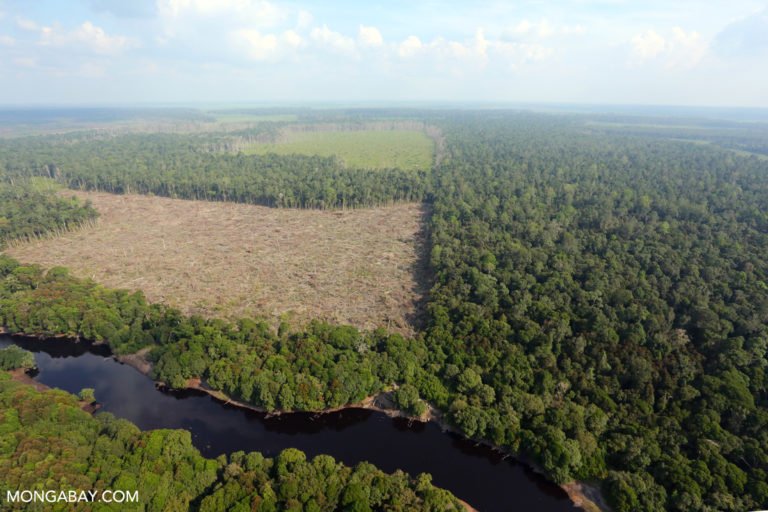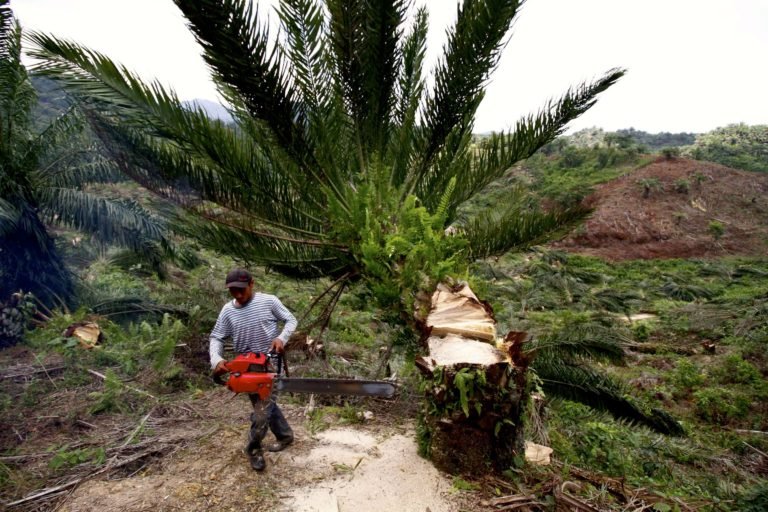- Indonesian lawmakers have demanded an accounting of the illegal palm oil plantations that continue to operate in the country, after the government revealed it had missed out on at least $3 billion in taxes from these companies in 2021.
- That figure itself is likely an underestimate, with a previous audit putting the lost revenue from just one province, Riau, at $7.4 billion.
- Lawmakers have given the environment ministry until the end of July to collect data on illegal plantations, including the identities of their owners, in Riau and Central Kalimantan provinces; the two provinces account for two-thirds of the illegal plantation area in Indonesia.
- Experts say uncovering the true identities of the plantation owners is the first step to addressing the problem, and should be followed up by an evaluation and improvement in the management of the palm oil industry.
JAKARTA — Lawmakers in Indonesia are pressing the government to uncover the true scale of illegal oil palm plantations in the country, following the revelation that the state missed out on more than $3 billion in taxes from these operations last year alone.
“The state suffered a tremendous loss,” Dedi Mulyadi, a member of parliament from the Golkar Party, said during a March 28 hearing with the environment minister, Siti Nurbaya Bakar. “[Our] lands are taken over by corporations and they enjoy the benefits, [but] don’t pay taxes. Why are there people in this country who can become rich in a short amount of time, while others are impoverished quickly?”
Pressed by Dedi to put a number to how much the state was losing out from illegal plantations, Siti told lawmakers that her ministry had identified 505 illegal plantations inside forest areas that are supposed to be off-limits to plantation activity.
Based on their size and output, these plantations should have paid taxes amounting to 44 trillion rupiah ($3.05 billion) in 2021, Siti said — a figure that’s a quarter of Indonesia’s COVID-19 budget last year. But because they’re operating illegally, they never pay taxes, she added.
But even this figure is likely to be an underestimate. An audit by local lawmakers in Sumatra’s Riau province, one of the main oil palm-growing regions of Indonesia, found that Riau alone is deprived of at least 107 trillion rupiah ($7.4 billion) in potential revenue every year from the illegal plantations operating there.
Hariadi Kartodihardjo, a forestry policy lecturer at the Bogor Institute of Agriculture (IPB), said the fact that companies have been allowed to run plantations for decades without paying taxes means the palm oil industry isn’t the driver of development that the government often makes it out to be.
“When they aren’t paying [taxes] for dozens of years, and then we say that the plantation industry is [empowering], how can it be when they don’t pay taxes?” he told Mongabay on the sideline of an event in Jakarta.
Lack of valid data
The government says it’s been trying to resolve the issue of illegal plantations for years. But one obstacle it cites is the lack of detailed data on the identity of the owners of these plantations.
“The Ministry of Environment and Forestry doesn’t have valid data,” said Sudin, a lawmaker who heads the parliamentary commission on environmental issues. He said the ministry’s data “are just based on satellite images that show there are [indeed] illegal plantations, like in Riau.”
He and the other commission members called on the environment ministry to carry out a thorough evaluation of plantations inside forest areas in the two provinces that are home to the largest swaths of illegal plantations, Riau and Central Kalimantan, within the next four months.
According to data from the environment ministry, there are 1.42 million hectares (3.51 million acres) of illegal plantations in Riau and 806,400 hectares (2 million acres) in Central Kalimantan. That’s two-thirds of the total 3.37 million hectares (8.33 million acres) of illegal plantations in the whole of Indonesia.
Sudin said the ministry must identify the owners, sizes and exact locations of the plantations. He added Siti had until May 31 to collect the data for Central Kalimantan, and July 31 for Riau.

An ‘easy’ problem
Abetnego Tarigan, the deputy for human development in the office of the president’s chief of staff, welcomed the data collection exercise as the first step toward solving the issue of illegal plantations.
“And also how to verify [the identities of the plantation owners], because we often see [plantations] said to be owned by locals, but they’re actually owned by top brass, or being affiliated with certain companies,” he told Mongabay on the sidelines of an event in Jakarta.
Abetnego said the issue of illegal plantations should be resolved by 2024, when Indonesia holds its next parliamentary and presidential elections.
“The legal instruments [to resolve the issue] already exist,” he said. “What’s left is the capability to collect data, verify and make a decision.”
Dedi agreed that it shouldn’t be difficult for the environment ministry to uncover the true owners of these illegal plantations by simply tracing the supply chain.
Much of the output from these plantations is processed in mills that then export the palm oil abroad. This leaves a paper trail that can be followed back to the plantation, Dedi said.
“There must be mills. Just trace [the supply chain]. I think this problem of illegal plantations is an easy one [to uncover],” he said.
Hariadi of IPB also said it should be relatively easy to identify plantation owners in Central Kalimantan and Riau because both provinces are being prioritized for a government program to put all plantation maps from various agencies and levels of government onto a single platform.
The One Map program, launched in 2018, is meant to unify all land-use data from a host of disparate sources in an effort to resolve overlapping claims that have led to conflict, human rights abuses and environmental damage.
“The data for Central Kalimantan and Riau is relatively complete because both are in the priority of the One Map policy,” Hariadi said. “So three months should be enough time” to collect the needed data on illegal plantations.

Fixing the management
Darori Wonodipuro, a lawmaker who used to head the forest protection unit under the forestry ministry, said previous lawmakers had already conducted their own fact-finding, back in 2011. At the time, the parliamentary commission overseeing the environment had obtained data on illegal plantations, complete with the identities of the owners, he said.
At an April 6 hearing, Darori gave more details of that earlier fact-finding. He said the commission had found 282 companies operating 3.9 million hectares (9.6 million acres) of illegal plantations in Central Kalimantan — nearly five times the area of illegal plantations reported by the environment ministry.
The environment ministry’s director-general of forest planning, Ruandha Agung Sugardiman, said the ministry had received the commission’s data in 2012.
“We will verify this data in the field, and to do this, we have established a task force,” he said during the April 6 hearing.
Edi Sutrisno, executive director of TuK Indonesia, an NGO that advocates for social justice in the agribusiness sector, said the data collection should be followed up by an evaluation to determine what to do with the plantations.
“If the evaluation shows that the plantations are bad [for local communities and the environment], then just revoke them all, stop their activities,” he told Mongabay in Jakarta. “But if there are already locals involved [in managing the plantations], then there might be considerations [to allow them to continue].”
Hariadi said the ultimate goal should be to improve the management of the palm oil industry to prevent illegal plantations and hold companies accountable for paying taxes and complying with their other obligations.
Even if the companies pay up what they owe in dodged taxes, he said, “as long as the management isn’t fixed, then the same problems will reappear.”
“Because the policies remain the same,” Hariadi added. “So we have to know the root causes.”
Banner image: Conservationist Rudi Putra monitors illegal oil palm plantations in the Leuser Ecosystem in Aceh, Indonesia. Image by Junaidi Hanafiah/Mongabay Indonesia.
FEEDBACK: Use this form to send a message to the author of this post. If you want to post a public comment, you can do that at the bottom of the page.











